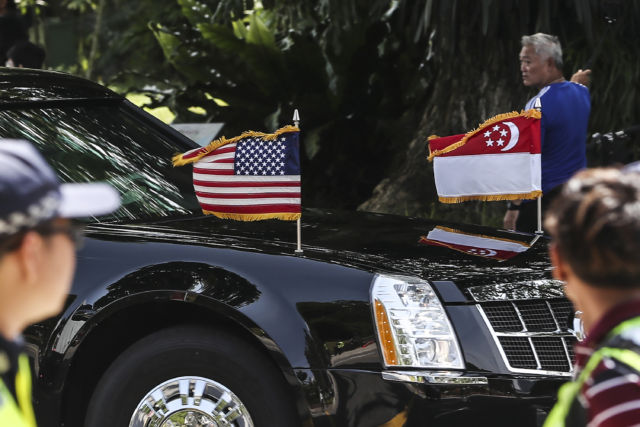The stakes are high when U.S. President Donald Trump and DPRK leader Kim Jong Un meet in Singapore. It will be the culmination of decades of diplomacy aimed at establishing peace on the Korean peninsula. Past attempts at denuclearization have failed.
CGTN’s Shane Hahm examines the shift reports.
The six-party talks, which involved both the ROK, and DPRK, the U.S., China, Japan, and Russia, failed to reach a lasting deal. It resulted in a 2005 agreement by Pyongyang to abandon its nuclear development in exchange for economic incentives. Even so, in 2009 the talks were suspended.
Hopes for a diplomatic solution were fading and a war of words between Washington and Pyongyang was escalating.
“North Korea best not make any more threats to the United States. They will be met with fire and fury like the world has never seen,” President Trump said.
“The entire United States is within range of our nuclear weapons, and a nuclear button is always on my desk. This is reality, not a threat,” said Kim Jong Un.
However, with the dawn of 2018 came an opportunity for a breakthrough. In his New Year’s Day speech, Kim Jong Un declared his country a peace-loving and responsible nuclear power. and called for better ties with South Korea.
By February, Kim would send a delegation to the Winter Olympics, and by April, the leaders of the ROK and DPRK would hold their first summit meeting in more than a decade.
That set the scene for a flurry of diplomatic activity, all leading up to an unprecedented meeting between the U.S. and the DPRK.
“It’s a new transformation. We’re seeing diplomatic movement from the leaders of the ROK, DPRK, and U.S. So, situations have completely changed compared to the past,” said Professor Yang Moon-Jin of the University of DPRK Studies.
Even so, skeptics are questioning whether the Trump-Kim summit will achieve a meaningful outcome based on past diplomatic efforts. Professor Moon-Jin has said past actions don’t necessarily predict or dictate future progress.
“I expect an agreement in principle and direction under a broad framework. Specifically, any agreement will stipulate the concept of complete denuclearization and complete regime security guarantees,” he said.
Over the past several months, we’ve seen intelligence personnel, high-ranking officials and working-level diplomacy throughout the region. Regardless of what comes out of the Trump-Kim meeting, diplomacy won’t stop there. If the past tells us anything, it’s that any diplomatic progress made until now could be all for naught, with the slightest misstep or miscalculation.
Daniel Schneiderman explains why attitudes matter for the Trump-Kim summit
CGTN’s Mike Walter spoke to Daniel Schneiderman about how language and attitude play a role in the outcomes of the Singapore summit. Schneiderman is the deputy U.S.program director at the International Crisis Group. He also worked for the National Security Council in the Obama Administration.
Jonah Blank: Kim Jong Un “won’t deliver” on denuclearization promises
CGTN’s Mike Walter spoke to Jonah Blank for his insight on the hype surrounding the Trump-Kim summit in Singapore. Blank is a senior political scientist at the RAND Corporation.
Jonah Blank discusses first face-to-face meeting between Trump and Kim
CGTN’s Mike Walter spoke to Jonah Blank about the first meeting between U.S. President Donald Trump and DPRK leader Kim Jong Un. Blank is the senior Political Scientist at the RAND Corporation.
 CGTN America
CGTN America The U.S. and Singapore flags are seen on the motorcade of U.S. President Donald Trump as it arrives at the Istana or Presidential Palace in Singapore, Monday, June 11, 2018, ahead of the summit between U.S. President Donald Trump and North Korean leader Kim Jong Un. Final preparations are underway in Singapore for Tuesday’s historic summit, including a plan for the leaders to kick things off by meeting with only their translators present, a U.S. official said. (AP Photo/Yong Teck Lim)
The U.S. and Singapore flags are seen on the motorcade of U.S. President Donald Trump as it arrives at the Istana or Presidential Palace in Singapore, Monday, June 11, 2018, ahead of the summit between U.S. President Donald Trump and North Korean leader Kim Jong Un. Final preparations are underway in Singapore for Tuesday’s historic summit, including a plan for the leaders to kick things off by meeting with only their translators present, a U.S. official said. (AP Photo/Yong Teck Lim)
